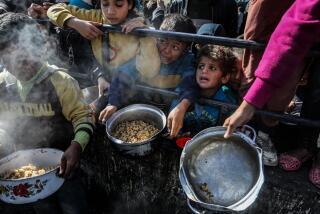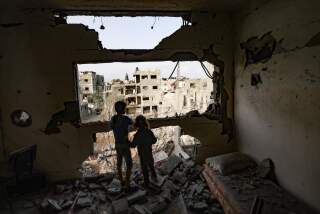Land mine victim labors to walk again
When Mohammed Malek left home to collect firewood, his mother warned him never to stray from the road.
He promised he wouldn’t.
But as the 15-year-old wandered through Kabul, Afghanistan, he spied some dried brush, ideal kindling, in a field.
He gingerly stepped off the road and headed for it.
There was an explosion, then another.
A few months later, Foreign Service officer Mark Ward was visiting a hospital in the Afghan capital when he noticed a bright-eyed teen, the victim of a mine blast, in the corner.
The young man strapped on a pair of prosthetic legs and began staggering across the room.
With every step, the jagged remnants of Malek’s femurs cut into his skin.
“He was red and sweating and tears were coming down his face,” Ward recalled. “We all yelled, ‘Stop it, stop it!’ He was in agony but utterly determined to show us he could walk.”
As a top administrator with the U.S. Agency for International Development, Ward had witnessed tragedy on an epic scale, including the devastation wrought by the 2004 Asian tsunami. Yet this one life affected him in a profound way, he said, perhaps because of what he saw represented in it.
“Malek epitomized Afghanistan. Imagine a country losing both of its legs through 25 years of war but determined to go forward,” Ward said. “Here was a kid with every reason to give up, but he didn’t give up. That was all I needed to see.”
Instead of walking past, Ward got involved. He worked on getting Malek into a U.S. hospital, eventually persuading Loma Linda University Medical Center to accept him.
On Nov. 3, three years after he stepped onto the minefield, Malek arrived in Loma Linda. He will undergo surgery to repair urological injuries as well as extensive scarring from burns on his chest and arms. Ultimately, he will get modern prosthetics and the chance to walk again.
“There are a lot of people who need help in Afghanistan,” said Jerry Daly, assistant vice president for global outreach at Loma Linda, which runs a hospital in Kabul. “Whenever you take an international charity patient, you try to choose cases where you are reasonably sure of the outcome. We think we can really help him.”
No one is more certain of success than Malek. Now 18, he has an incandescent smile and sunny disposition that seem to defy the very serious health challenges he faces.
“I played [soccer] in Afghanistan, and when I get new legs, I will play again,” Malek said through an interpreter.
His legs were ripped off near the hips, and he travels by wheelchair or sometimes walks on his hands. Lumpy bits of shrapnel jut under his skin like pebbles.
Malek’s world today is utterly different from the one he left behind. Home in Kabul is a dreary concrete block with no plumbing or electricity. His family fled to Pakistan after the Taliban took power, returning only when the oppressive regime was ousted by U.S. and Afghan forces in 2001.
Malek helped support his family by working in a bakery and washing cars. After losing his legs, he lost both jobs and had to get around Kabul’s unpaved streets in a rickety wheelchair.
These days, he starts each morning with a swim and then eats in the medical center cafeteria. His afternoons are spent in his small university-provided apartment, where the Dari-speaking teen learns English from a tutor and through computer programs. Given the slightest opening, he’ll blast visitors with a litany of vocabulary and even a few sentences.
“Dog, chair, clock, tree, telephone, shoes, pen,” he declares triumphantly. “Teeth, lab, nurse, arm, leg.”
Growing increasingly animated, he says, “I am from Afghanistan. What country are you from?”
His chaperon, translator and roommate is Mohammed Ayoub, a towering, bearded former mujahid who fought against Soviet troops when they invaded Afghanistan in 1979.
Ayoub is Loma Linda University’s county director in Afghanistan, where he usually lives.
He is quiet but unfailingly hospitable, brewing mint tea and serving plates of dried fruit and nuts whenever guests visit.
Yet both realize that Malek is not a tourist; he’s a patient and the stakes are high.
Two weeks ago doctors performed their first surgery on him, smoothing his jagged femurs, then wrapping the ends in cushions of muscle, fat and skin to help them eventually withstand artificial legs.
Malek’s usual composure cracked on a doctor’s visit when he was having his dressings changed.
He lay on the table rocking back and forth. His body jerked violently whenever he was touched. Tears rolled down his cheeks.
“He’s having reactive nerve pain now,” said Dr. Christopher Jobe, chairman of Loma Linda’s Department of Orthopedic Surgery, who performed the operation. “It feels like an electrical shock. But I expect him to do well. He’s a tough kid.”
Malek spoke to Ayoub.
“He feels the leg as it was just before the explosion,” Ayoub said. “He is reliving that moment again.”
But by the time he left the office, Malek was smiling again.
Over the last few weeks, Loma Linda staffers have taken Malek to Laguna Beach, Balboa Island, Calico Ghost Town and the Crystal Cathedral.
“Malek likes the ocean best,” Ayoub said. “He does not have this in Afghanistan.”
Aside from Ayoub, Malek’s only other reminder of home is the small mosque he attends in neighboring Redlands.
On a recent rainy Friday, a line of Muslims inside the mosque bowed toward Mecca. Malek couldn’t prostrate himself because he had no legs to bend, so he bowed his head repeatedly.
Abdul Ghaniezadeh, a fellow Afghan, remarked, “There are thousands of people in Afghanistan who are suffering, and Malek won the lottery.”
Perhaps, but the man who helped him win it wanted to be sure.
Ward, who had seen Malek just once since the meeting at the Kabul hospital, flew in from Washington, D.C., last month for a surprise visit.
“Welcome!” exclaimed Ayoub, when the lanky diplomat appeared at his door.
Malek, busy searching for his Kabul house on Google Earth, looked up from the computer screen. His eyes widened.
“You remember me, don’t you?” Ward asked as Ayoub translated.
Malek nodded vigorously.
“Do you remember walking across that floor? You made it all the way across the room.”
Malek’s grin faded for a moment.
“There was too much pain when I walked before,” he said.
The pair chatted about life in America. Malek praised the balmy weather, the doctors and the friends who spent weekends showing him around. Pressed, his only negative comment was about pizza, which he said he did not like.
Ward asked him about the day he was wounded.
“My mother told me not to go off the road, but I had to because that’s where the best brush was. It was in a field near the airport,” he said, as Ayoub translated. “When the first mine exploded, it lifted me up and I came down. My leg was in little pieces. I staggered a bit and another mine went off. Then I started going into shock.”
The mines were left from the Soviet occupation, Ayoub said.
Afghan soldiers rushed to Malek’s aid.
“They held out a rag for me to hold onto while they pulled me off the minefield,” he said. “They took me by car to a hospital run by the Italians.”
Malek smiled and lifted his shirt, revealing ugly burns on his chest and arms.
Ward grimaced. “In my line of work you have to be an optimist. You learn to find hope in very small things because that’s all you can find,” he said. “Seeing Malek get across the room that day showed his determination, and that is why he is here today.”
Ward turned to him.
“Do you know why you are here?” he asked.
Malek thought a moment.
“Thank you,” he said in English, hoping he had struck upon the right response. “Thank you very much.”
Ward shook his head.
“If you want to know who to thank, don’t thank me,” he said. “You are the reason you are here today. Thank yourself.”
More to Read
Sign up for Essential California
The most important California stories and recommendations in your inbox every morning.
You may occasionally receive promotional content from the Los Angeles Times.










